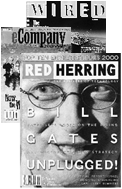Illusions of cool wealth
BY GREGORY BOYD BELL
 Walk by any
magazine rack, and you can't miss them -- massive, brightly coloured titles like
Red Herring, Business 2.0, eCompany Now and Wired. They are the "new
economy" magazines, and they are the hottest things in periodical
publishing. Walk by any
magazine rack, and you can't miss them -- massive, brightly coloured titles like
Red Herring, Business 2.0, eCompany Now and Wired. They are the "new
economy" magazines, and they are the hottest things in periodical
publishing.
Over the past year these magazines have become the fattest on the newsstand,
next to seasonal editions of Vogue and wrist-straining bridal annuals. Indeed,
they share characteristics with their fashion sisters. They're packed with ads
-- the September issue of Red Herring is 552 pages -- and they succeed by
selling readers a fantasy world.
Despite the promises on the covers of fashion mags, their readers generally
know that a magazine isn't going to make them better-looking or better in bed.
The new-economy titles promise to make you rich and powerful (and consequently
sexy). The big difference is that the new kids on the rack take it seriously.
On the surface these magazines are about the business of new media, Internet
technology, software and digital hardware, but the point isn't just making money
-- it's getting rich the new, cool way. Stalwarts like Fortune and Business Week
are fine for boring old suits, but the new titles are young, hip and fun.
Successful mass-market magazines get that way by selling an illusion. With
Time, it was the notion that world events could make sense from an American
perspective. With Rolling Stone, it was playing at being a cultural rebel. With
the new-economy magazines it's cool wealth -- having the newest toys and the
best office in the coolest company. It's an impressive feat when you consider
that the majority of the businesses are variations on catalogue marketing or the
phone company. For all the paradigm-shifting and business-model-busting, the
best summation of these magazines was a recent headline in Red Herring:
"Buy Anything, Anywhere, Anytime."
The message is success through knowledge and attitude. Take control of your
life, get those stock options and give him/her a night to remember. (The August
Fast Company ran a quiz to determine whether you've got what it takes to be an
entrepreneur. Oddly, none of the questions was "Do you have rich
relatives?")
The message is so loud it almost obscures the content, even though most of
the stories and ads involve entities owned or beholden to the largest
corporations on the planet. Even when the subject is a cog in a gigantic
enterprise, the fantasy of individual heroism must be sustained -- thus the word
"intrapreneur," which signifies a person so detached from reality as
to believe they are self-employed even while surrounded by an office full of
employees. It's a celebration of self so narcissistic that beauty magazines pale
by comparison.
The hollowness of this celebration is exposed in a delightfully nasty book by
Paulina Borsook, Cyberselfish: A Critical Romp Through the Terribly Libertarian
Culture of High-Tech (Public Affairs). Borsook watched the rise and implosion of
the original new-economy magazine, Wired, from the inside, and is unsparing in
her analysis of the "self-glorifying rhetoric" with which these
magazines flatter readers and advertisers.
As Borsook makes clear, a paradox undermines the self-satisfied new economy:
it is a child of government, born in publicly funded universities and weaned on
military and research grants. Yet its adherents preach that government is bad,
calling for less government and unfettered corporate action. They live in a
global monoculture of clean code and demographic analysis, of low taxes, fat
data pipes, lighter laptops, natural fabrics, freelance agents, corporate
feudalism and the devil take the hindmost.
The great achievement of America's post-industrial economy is a method by
which very intelligent people can be worked half to death to enrich
stockholders. That they're better paid than their Industrial Revolution
equivalents is unquestionably Progress. They may even earn stock options, though
not in a quantity to upset the ownership structure. It is a corporate culture
based on, as Borsook says, "casual dress and no rest for the weary."
(The magazines are also exemplars of the latest technique for addressing the
question of what to do about society's have-nots: pretend they are not there.)
As in fashion magazines, the advertising is at least as useful as the
editorial. In the race to be the first to profile hot new ventures, these
magazines cover companies that are locked by investors into religious silence
about what they are actually doing. The resulting gibberish makes the ads seem
downright forthright and informative.
Those searching for sensible news of the wired world do have alternatives,
like The Economist. But for a quick hit of entertaining dot-com business
coverage, visit <www.FuckedCompany.com>,
where mass firings, embarrassing resignations and other screw-ups of the new
economy are recorded as they happen. It won't make you rich -- but it also won't
strain your wrists.
Media appears every other week.
|